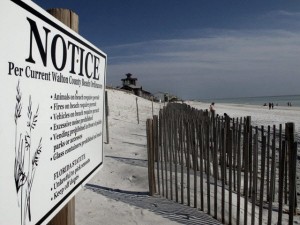 No state has a longer shoreline than Florida – over 2,000 miles of shoreline, with 825 miles of beaches. These beaches define Florida’s top industry of tourism and are in a constant state of erosion. Understandably, Florida has embraced the “public trust doctrine,” which dictates that tidal lands are held in trust for the people of Florida. The boundary between state-owned tidal lands and upland properties has traditionally been the “mean high water line” (“MHWL”). The MHWL may move inland due to erosion or seaward when land gradually forms (through accretion). However, the boundary will not shift due to a sudden change in the shoreline (through avulsion).
No state has a longer shoreline than Florida – over 2,000 miles of shoreline, with 825 miles of beaches. These beaches define Florida’s top industry of tourism and are in a constant state of erosion. Understandably, Florida has embraced the “public trust doctrine,” which dictates that tidal lands are held in trust for the people of Florida. The boundary between state-owned tidal lands and upland properties has traditionally been the “mean high water line” (“MHWL”). The MHWL may move inland due to erosion or seaward when land gradually forms (through accretion). However, the boundary will not shift due to a sudden change in the shoreline (through avulsion).
Recognizing the need to protect Florida’s beaches, Florida’s legislature enacted the Beach and Shore Preservation Act (“BSPA”) in 1965. Since then, Florida has restored approximately 200 miles of beaches through sixty actively managed projects.
The BSPA was amended in 1970 to define the property boundary for restoration projects along critically eroded beaches as the “erosion control line” (“ECL”). By adopting a fixed boundary for restoration projects, the BSPA meant to avoid boundaries that were constantly shifting due to coastal dynamics. Under the BSPA, the state would pump sand into the restoration area primarily on the state side of the ECL, creating a buffer of “sacrificial sand” that would protect the beaches and upland property. The 1970 amendments preserved, and arguably supplemented, the rights of landowners whose properties under the Act extended to the ECL rather than the MHWL.
With the devastating hurricane and storm damage we have seen over the last decade, Florida realized that it could no longer focus solely on its southern beaches. Florida decided to spend a total of $15 million – $4 million of state money and the rest paid by the local community and the town of Destin – to restore approximately seven miles of beach in Walton County, a jurisdiction located in Florida’s panhandle. In keeping with the BSPA, the state set the property line at the wet sandy beach. The project was designed to create a narrow strip of dry beach by piling new sand where water – and therefore sovereign state land – once was. What the project also created was a legal quagmire between government officials and private landowners that has now made its way to the United States Supreme Court.
State and local officials argue that the restoration project provides the private landowners with storm damage and erosion protection without taking land or property rights from the landowners. The officials note that, consistent with the BSPA, the project preserves all upland owners’ rights of view, access and use of the waters. You can read more on these arguments in the state’s brief and the brief for Walton County and the City of Destin.
Private landowners instead see a “land grab” that robs them of their right to gain land by accretion and their right to have their property in continuous and direct contact with the water. They complain that the officials dumped sand in their backyard to create what is now considered a public beach. To read more on the landowner’s arguments, read Stop the Beach Renourishment, Inc.’s brief and reply brief.
The Florida Supreme Court’s lengthy opinion concluded that the beach restoration program reflected “the state’s constitutional duty to protect Florida’s beaches in a way that reasonably balances public and private interests.” The court found that landowners maintained their rights to access and view the water, but that Florida law provides no basis for the landowners to own the new narrow strip of dry sand as private property, and therefore no basis for the property owners to demand compensation.
The United States Supreme Court has previously addressed whether a legislative or executive decision can amount to a constitutional taking. But now this case – Stop The Beach Renourishment, Inc. v. Florida, Case No. 08-1151 – raises the question of whether a state court decision can amount to an unconstitutional taking of property. Based on comments from the Justices during oral argument last week, the opinion will likely not be unanimous, as noted in NPR’s December 2, 2009 article, High Court Appears Divided on Beach-Property Case. Complicating things is the fact that Justice Stevens, who owns a Florida beachfront apartment, was absent from the oral argument, making it possible that the Justices will not have the votes one way or the other to reach a majority opinion.
My guess is that the United States Supreme Court will find a way to avoid deciding the novel issue of whether the Florida Supreme Court’s decision can be considered a taking, and will not disrupt the Florida Supreme Court’s determination that the beach preservation project did not take any legally cognizable state property right from the land owners. Any other thoughts or predictions out there?
Image by: Melissa Nelson/AP
